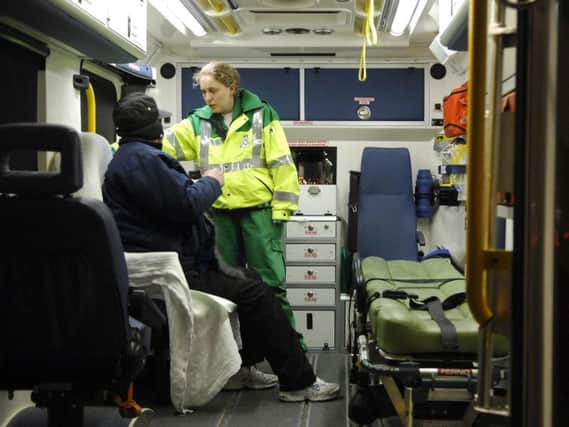Fewer than 1.5 per cent of physical assaults on NHS staff result in conviction under Emergency Workers Act


Fewer than 1.5 per cent of physical assaults on NHS staff result in a conviction through the use of legislation specifically designed to protect them, according to new statistics.
In 2017/18, the latest year for which figures are available, 190 people were convicted under the Emergency Workers Act (EWA) – a law introduced in 2005 to protect nurses, doctors and paramedics. Figures for the same year show there were 12,759 physical assaults recorded by Scotland’s 14 health boards, meaning just 1.49 per cent led to a conviction – the lowest rate in six years.
Advertisement
Hide AdAdvertisement
Hide AdThe new statistics, which show that an attacker of a healthcare worker is half as likely to be convicted as they were in 2013, come just days after it was revealed that NHS workers have suffered almost 94,000 verbal and physical assaults in the past five years, with 65,996 physical attacks on health service staff between 2014 and 2019.
'Insult to brave healthcare workers'
Scottish Conservative health secretary Miles Briggs said NHS workers would continue to be at risk unless more work was done to punish those responsible for attacking them.
“It would be unrealistic to expect all reports of NHS assaults to end up in the court room,” he said. “But the fact just 1.5 per cent of physical assaults result in a conviction is a real insult to our brave healthcare workers.
“These are caring professionals who put themselves on the line to protect us – the least they should expect is protection by the law. Progress on tackling violence against NHS staff will never be made unless we start getting tough on those responsible for it.
“As it stands, under this soft-touch SNP government, someone who attacks an NHS worker has nearly a 100 per cent chance of getting away with it.”
The statistics show that in 2013, 334 people were convicted under the EWA from the 10,175 assaults recorded – a rate of 3.28 per cent.
In 2014, while the number of assaults fell to 9,363, the rate of conviction still stood at 3.12 per cent, with 292 people sentenced.
Since 2015 there has been a decline in convictions from 2.33 per cent to 1.49 per cent, while the number of assaults has risen from 12,444 to 12,758 in 2018.
Figures may exclude prosecutions for more serious attacks
Advertisement
Hide AdAdvertisement
Hide AdHealth secretary Jeane Freeman has described the EWA as providing “legal protection to ambulance workers, doctors, nurses and midwives working in a hospital or responding to an emergency”, and anyone found guilty under the legislation faces up to a year in jail and a fine of up to
£10,000.
The Scottish Government has said incidents of violence fell in the last year and support was in place for NHS staff, through training and trauma counselling.
A spokesperson said: “Any violence or aggression against NHS staff is absolutely unacceptable and we have made clear that boards should take appropriate action against those responsible.
“These figures cover a wide range of incidents and the conviction statistics relate only to prosecutions under the Emergency Workers Act, therefore excluding where serious attacks on staff may have been prosecuted using other offences such as assault, which allow for lengthier sentences.
“Police will investigate any allegation of criminal behaviour reported to them and, where appropriate, submit a report to the Procurator Fiscal who makes decisions about prosecutions.
“Where a prosecution proceeds, the Court will determine in each case whether or not there should be a conviction based on all the facts before them.”
A proportion of the incidents recorded by the NHS are reported to police for investigation of an alleged criminal offence and, following investigations, a report may be submitted to the Procurator Fiscal.
In such cases, the Crown has a range of powers to deal with alleged offences, including initiating criminal proceedings, or using alternatives to prosecution to deal with less serious incidents in a proportionate, quicker and formal way while retaining case information in central records in case an individual commits a further offence.